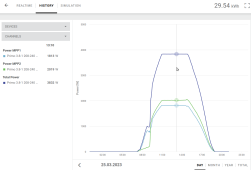I just came across a YouTube video on clipping. I've never heard of it before. It may not be an issue for me but I'm looking for advice.
What are my options and is it worth it?
I have a magnum 4400 w inverter and 8910 w of solar panels. The main reason for so many panels is to get more power during the cloudy winter months (NE U.S.).
Thank you
What are my options and is it worth it?
I have a magnum 4400 w inverter and 8910 w of solar panels. The main reason for so many panels is to get more power during the cloudy winter months (NE U.S.).
Thank you




